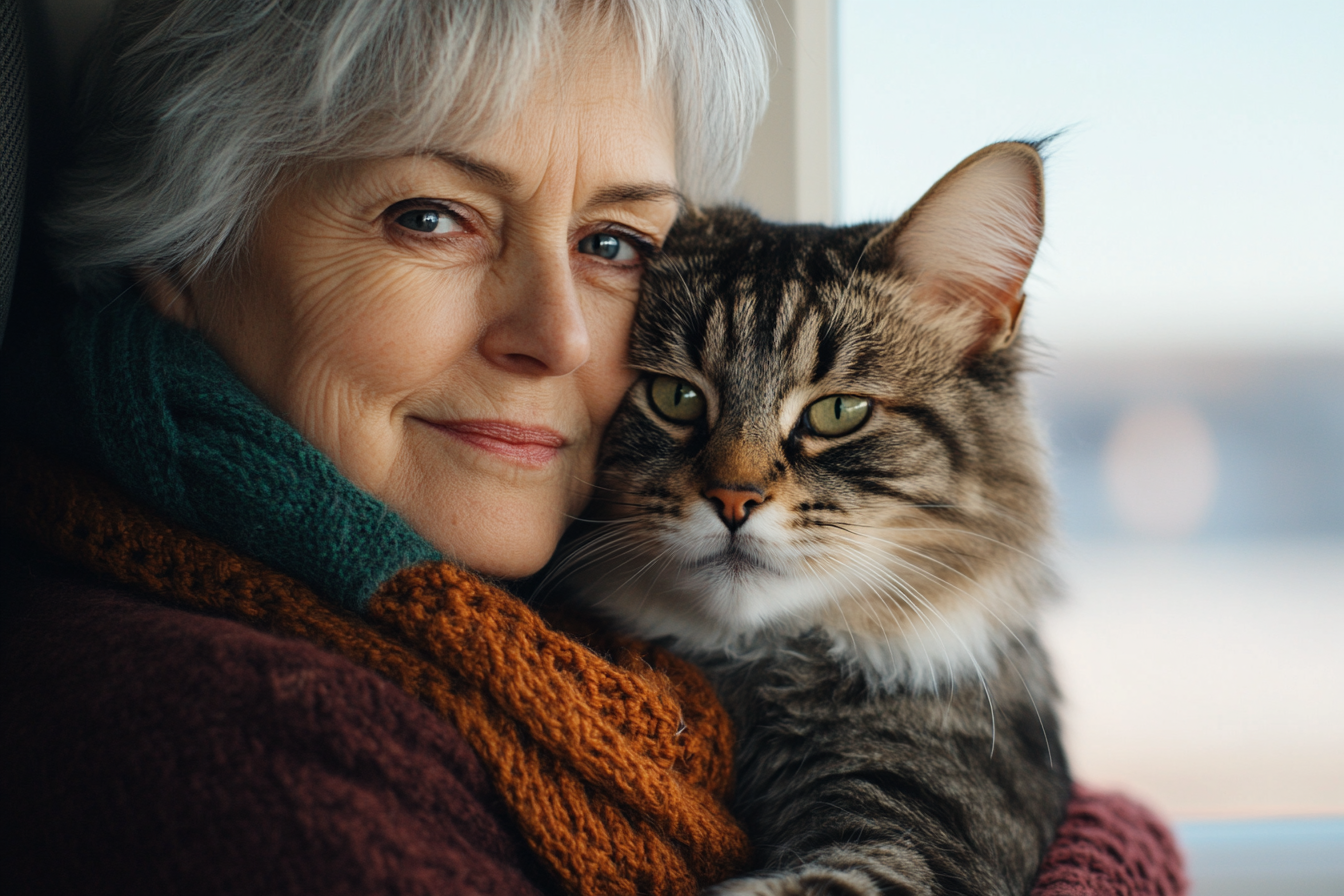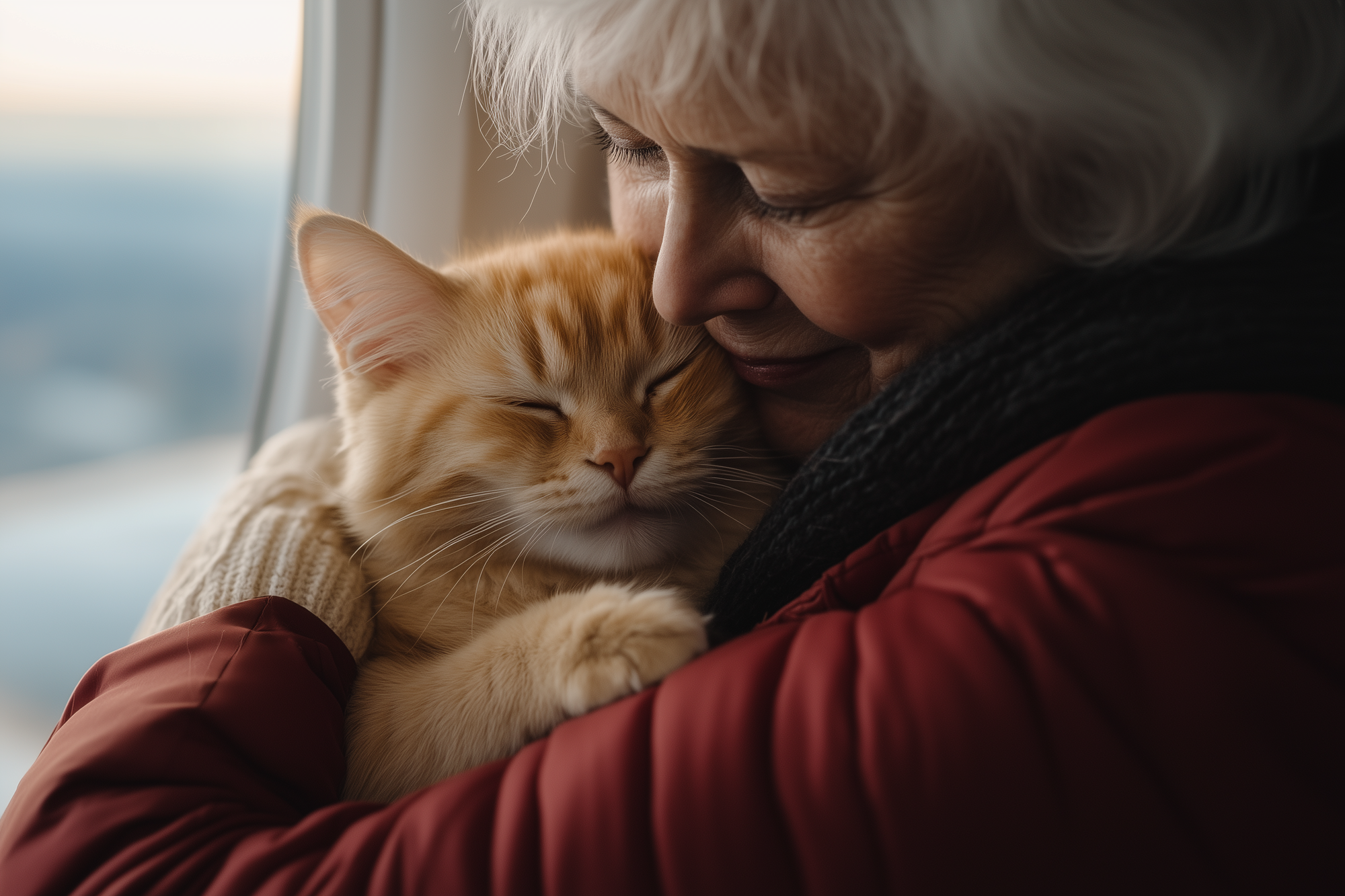From Challenges to Comfort: Palliative Care for Dementia Patients
Practical ways palliative care makes life more comfortable for dementia patients, addressing their physical and emotional needs with care.
Pets inspire older adults to stay active, keep connected, and enjoy the simple joy of friendship, offering support that enhances health and well-being in countless ways.

Imagine a quiet afternoon in a cozy, sunlit living room. There's an older man seated in his favorite armchair, reaching down to pat his dog, who’s snoozing at his feet. This isn’t just any afternoon for him—it’s filled with warmth, companionship, and even a little bit of exercise. Every day is a bit brighter and a touch less lonely with his good furry friend by his side.
Pets aren’t only companions. They are loyal friends, quirky housemates, and, for many seniors, a source of joy. As we age, life changes in ways we don’t always expect, bringing new challenges we might not have prepared for. In this phase, pets can offer a simple yet powerful form of companionship. They provide purpose, promote well-being, and keep things interesting. Research increasingly supports what pet owners have long known: animals bring real health benefits that go from from the physical to the deeply emotional. For older adults, this companionship can sometimes go beyond the typical relationship with a pet—it can become a lifeline and reason for getting out bed.
Owning a pet might seem like just a nice way to add a little happiness to your life, but the physical benefits are surprisingly substantial. For those in their later years, when health risks can increase, having a pet may be one of the most effective (and enjoyable) ways to stay active and healthy.
It’s a remarkable connection, but studies show that pet owners—particularly dog owners—tend to have healthier hearts. The routine of walking, feeding, and caring for a dog contributes to healthier blood pressure, lower cholesterol, and decreased triglyceride levels. What starts as a simple walk around the block becomes a daily investment in heart health, reducing the risk of cardiovascular disease and even keeping doctor’s visits to a minimum. And if you’re the sort who finds a treadmill uninspiring, think of a wagging tail as the best personal trainer money can’t buy. Dogs encourage natural movement, fresh air, and a few extra steps every day—small changes that add up to serious health improvements.
Speaking of exercise, dogs in particular provide a built-in excuse to move, rain or shine. They need to walk, they love to play, and they don’t mind a bit of mud. For seniors, this means regular opportunities to get outside, walk, and stretch muscles that might otherwise sit idle. It’s no surprise that dog owners report greater cardiovascular fitness, better balance, and even healthier weight management.
For seniors who choose other pets, like cats or even birds, there’s still an increase in movement that comes from feeding, cleaning, and engaging with an animal that depends on you. These little bursts of activity keep muscles engaged, joints moving, and, for some, reduce the risk of injury that comes from being sedentary. Even small pets are surprisingly effective at getting us on our feet.
Animals stimulate more than just the body; they engage the mind. Seniors who interact with their pets often report sharper cognitive skills and improved memory. Whether it’s teaching a new trick, having “conversations,” or simply spending time in thoughtful observation, pets bring a surprising mental workout to the table. For someone looking to maintain or even improve cognitive function, having a pet can be a uniquely stimulating relationship. The routines and unpredictable joys of animal companionship prompt creativity, decision-making, and problem-solving—all of which contribute to a more agile, active mind.

Pets aren’t just good for the body—they can uplift the spirit in ways that humans sometimes can’t. For older adults, who may face loneliness, reduced social circles, or even the loss of longtime friends and family, pets offer steady, unconditional companionship. These animals become something constant in a world that may be shifting.
Petting a cat, playing with a dog, or watching fish swim in a tank can calm the mind. Animals have this wonderful ability to live in the present, which often reminds us to do the same. Studies reveal that spending time with pets can release endorphins, lowering stress levels and creating feelings of happiness and relaxation. For seniors with anxiety, these effects are like a balm, helping to create a calm, steady presence in daily life. And unlike humans, pets never judge or criticize—they’re just there, ready to offer comfort.
When days get quiet, pets fill the silence with soft breathing, little movements, and playful (and sometimes annoying) behavior. For many seniors, pets provide a sense of companionship that feels grounding. They give older adults a chance to care for someone who depends on them, bringing back a sense of purpose that can be transformative. Cats, dogs, birds—these animals all give something back in their own way, helping to alleviate loneliness and creating a feeling of being needed.
Pets also offer a unique form of emotional support. They listen without judgment, they offer warmth without question, and they are endlessly patient. The security and comfort that pets bring is irreplaceable, especially in later years when life can sometimes feel uncertain.
There’s something profoundly uplifting about caring for another being. For older adults, caring for a pet can give a meaningful boost to self-esteem and offer a sense of accomplishment. It’s a small but significant way to feel in control, responsible, and capable. Pets have an innate ability to lift spirits and make life feel just a bit more rewarding. They remind us of our own kindness, our ability to love and nurture, and our capacity for loyalty. These are feelings that can enhance mood, life satisfaction, and promote a general sense of happiness.

Beyond their direct companionship, pets often help older adults break out of social isolation. Dogs, in particular, serve as natural conversation starters, inviting interactions with neighbors, strangers, and other pet owners. When pets come along, introductions seem to make themselves.
It’s amazing how dogs can make friends of strangers. Walking a dog or taking it to a park can create countless opportunities for small conversations and chance encounters. And these moments aren’t trivial—they can help build social circles, forge connections with neighbors, and even foster new friendships. For seniors, who might find it harder to meet people, pets act as social catalysts, helping expand the network of familiar faces and supportive relationships. And a dog’s smile is often the only icebreaker anyone needs to start a conversation.
Pets, by their very nature, thrive on routine. They need regular meals, walks, and playtime, and they have a knack for reminding us when it’s time for each. This structured daily rhythm is invaluable for older adults, providing a routine that can feel both calming and purposeful. Routine doesn’t just make life easier—it can also help keep the mind sharp, as following and maintaining a schedule requires mental engagement. For those who might otherwise find the days blurring together, a pet’s routine brings consistency, focus, and even a bit of gentle discipline.
Pet ownership can make a striking difference for seniors dealing with specific health conditions, providing support that is uniquely comforting and, in some cases, therapeutic.
For seniors experiencing dementia or Alzheimer’s, pets can be calming and engaging in ways that traditional support systems may struggle to replicate. Research has shown that interacting with pets can spark memory recall, helping individuals with dementia connect with past experiences and familiar routines. A cat curling up in a lap or a dog resting at one’s feet offers a gentle, grounding presence, often reducing agitation and anxiety. In memory care settings, even short pet therapy visits have shown impressive results, providing brief moments of joy and clarity that can linger well beyond the interaction. For these individuals, the simplicity and warmth of pet companionship can cut through confusion and bring a reassuring sense of connection.
Pets are also known to help with pain management, offering a unique form of distraction that can reduce the perception of physical discomfort. For older adults dealing with chronic pain or conditions, the act of petting an animal or focusing on the playful antics of a pet can shift attention away from pain. Researchers have noted that the presence of a pet can encourage the release of endorphins, which, while reducing stress, also provide mild pain relief. This doesn’t mean pets replace medication or other treatments, but they add an additional layer of comfort that can contribute to an overall sense of well-being. After all, when a dog leaps into the room with a squeaky toy, pain is often the last thing on one’s mind.

Pets bring companionship, but adopting a pet is a significant commitment. For older adults, it’s essential to consider not only the immediate excitement of a pet but also the practicalities of long-term care. Ensuring the right fit can make pet ownership a deeply fulfilling experience without adding unexpected challenges.
First, it’s helpful to evaluate personal mobility and stamina. Dogs, especially large or energetic breeds, may require more exercise and strength to handle than some seniors are comfortable with. A smaller dog, a low-maintenance cat, or even an aquarium of fish can still bring companionship with less physical demand. For seniors who want the companionship of a dog but may not be able to keep up with the walking needs, community support services often provide options for dog-walking assistance or pet care, allowing pet ownership to remain manageable. Also, don't forget that pets poop every day, and you need to have the knees to bend over and pick it up!
Pets come with recurring expenses, including food, vaccinations, grooming, and vet visits. Older adults should assess their budget to ensure they can meet these needs comfortably. For those on a fixed income, animal shelters, nonprofits, and local animal welfare organizations sometimes offer financial assistance or reduced-cost vet care for seniors. Planning for these costs beforehand helps ensure that the relationship with a pet remains stress-free and joyful.
Housing can impact pet ownership. Many older adults live in apartments, senior living facilities, or retirement communities that may have specific rules about pets. Fortunately, some senior living centers welcome pets and even offer amenities like pet parks and visiting pet therapy services. For those in no-pet housing, volunteering at a local animal shelter or participating in animal therapy programs can be a rewarding way to enjoy animal companionship without full-time responsibility. Many organizations facilitate interactions with animals, bringing the benefits of pets to seniors who cannot own them permanently.

For seniors who require additional support, a service animal might be an ideal option. Service animals are trained to assist with specific tasks—guiding visually impaired owners, helping with mobility, or providing reminders for medication—enabling greater independence and a higher quality of life. These animals also have certain legal protections, allowing them to accompany their owners in more spaces, including on flights. This can be especially beneficial for seniors who want to travel or who face accessibility challenges.
Emotional Support Animals (ESAs) are another option, especially for those with anxiety or depression. Although ESAs don’t have the same legal status as service animals, they can live in many types of housing that may otherwise restrict pets. While policies have recently limited ESAs on flights, they remain a valuable source of comfort for those looking for a consistent and calming presence. If you want to learn more, you can explore services that help you keep your pet with you when you travel.
Housing restrictions can also impact pet ownership decisions. Many seniors live in apartments, retirement communities, or assisted living facilities with specific rules around pet ownership. It’s essential to check any guidelines or restrictions before bringing a pet home. Some communities, however, encourage pet companionship, even offering pet therapy programs or visiting animals that bring companionship without the responsibilities of ownership. For those who can’t own pets, volunteering at animal shelters or participating in pet therapy sessions can be a wonderful way to enjoy the benefits of animals without the full-time responsibility.
The companionship, routine, and genuine joy pets offer can add rich layers of meaning to life, particularly for older adults seeking connection and vitality in their daily routines. While it’s true that adopting a pet is a decision that requires thought and commitment, the rewards are often well worth the effort.
A loyal pet can offer more than just affection; it can provide a sense of stability, a reason to stay active, and a companion to share the quieter moments with. For seniors, pets are more than animals—they are friends, therapists, motivators, and family members rolled into one. They brighten the days and offer comfort during the nights, creating a profound impact that is as enduring as it is heartwarming.